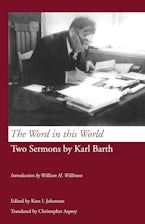The Word in this World
Two Sermons by Karl Barth
by Karl Barth
Edited by Dr. Kurt I. Johanson
Translated by Christopher Asprey
Imprint: Wipf and Stock
66 Pages
Other Retailers:
"An important feature of this booklet is the inclusion of two contrasting sermons by Barth--the 'monster of a full scale Titanic sermon' of 1912, and the sermon of Christ's walking on the lake of 1934. In different ways these dealt with disasters, the unfortunate disaster of 1912, and the far more serious disaster of rising Hitlerism in 1934. How did it come about that the approaches were so very different? A simple answer lies in Barth's threefold development of the doctrine of God's word. . . . The 1912 sermon fails by all these standards. The 1934 sermon passes, and proves to be a more powerful response to the current situation."
--Geoffrey W. Bromiley, translator of Church Dogmatics and author of An Introduction to the Theology of Karl Barth
"Karl Barth's two sermons dramatically reflect his preaching in two distinct phases. In each, he is seeking a word to proclaim to the congregation; but in dramatically different ways. . . . These sermons, with Bishop Willimon's fine introduction, clearly show the preacher Barth was and the preacher Barth became, while also directly challenging the contemporary church always to listen to God's Word, to trust, and to obey."
--Donald K. McKim, Editor, How Karl Barth Changed My Mind
"The mighty Karl Barth still speaks in our postmodern world. . . . His preaching once was one of the great voices in the context of the rise of Hitler's rise to power in Germany. His voice is still audible, along with those of Martin Niemuller, Helmut Thielicke, and Dietrich Bonhoeffer. These great preachers are examples of Germany's biblically grounded Reformation preaching."
--James D. Strauss, Professor Emeritus of Theology and Philosophy, Lincoln Christian Seminary, Lincoln, Illinois
"The sermon from Bremen reminds me how I as a boy experienced the last sermons of my grandfather in the Basel prison: line by line he brought the biblical text anew to speech (to life in speech). Listen: whoever wants to preach in this way must at the same time stand just as awake and engaged in current events as this comes to expression in the Titanic sermon. In this way the two sermons make a suspenseful pair (maybe even a dialectic pair)."
--Dieter Zellweger, President of the Karl Barth Legacy Commission and Karl Barth's grandson
Kurt I. Johanson is Pastor at Pleasant Grove Church in Dallas, Texas, and formerly adjunct lecturer in Homiletics at Dallas Christian College.
“An important feature of this booklet is the inclusion of two contrasting sermons by Barth—the ‘monster of a full scale Titanic sermon’ of 1912, and the sermon of Christ’s walking on the lake of 1934. In different ways these dealt with disasters, the unfortunate disaster of 1912, and the far more serious disaster of rising Hitlerism in 1934. How did it come about that the approaches were so very different? A simple answer lies in Barth’s threefold development of the doctrine of God’s word. . . . The 1912 sermon fails by all these standards. The 1934 sermon passes, and proves to be a more powerful response to the current situation.”
—Geoffrey W. Bromiley, translator of Church Dogmatics and author of An Introduction to the Theology of Karl Barth
“Karl Barth’s two sermons dramatically reflect his preaching in two distinct phases. In each, he is seeking a word to proclaim to the congregation; but in dramatically different ways. . . . These sermons, with Bishop Willimon’s fine introduction, clearly show the preacher Barth was and the preacher Barth became, while also directly challenging the contemporary church always to listen to God’s Word, to trust, and to obey.”
—Donald K. McKim, Editor, How Karl Barth Changed My Mind
“The mighty Karl Barth still speaks in our postmodern world. . . . His preaching once was one of the great voices in the context of the rise of Hitler’s rise to power in Germany. His voice is still audible, along with those of Martin Niemuller, Helmut Thielicke, and Dietrich Bonhoeffer. These great preachers are examples of Germany’s biblically grounded Reformation preaching.”
—James D. Strauss, Professor Emeritus of Theology and Philosophy, Lincoln Christian Seminary, Lincoln, Illinois
“The sermon from Bremen reminds me how I as a boy experienced the last sermons of my grandfather in the Basel prison: line by line he brought the biblical text anew to speech (to life in speech). Listen: whoever wants to preach in this way must at the same time stand just as awake and engaged in current events as this comes to expression in the Titanic sermon. In this way the two sermons make a suspenseful pair (maybe even a dialectic pair).”
—Dieter Zellweger, President of the Karl Barth Legacy Commission and Karl Barth’s grandson











